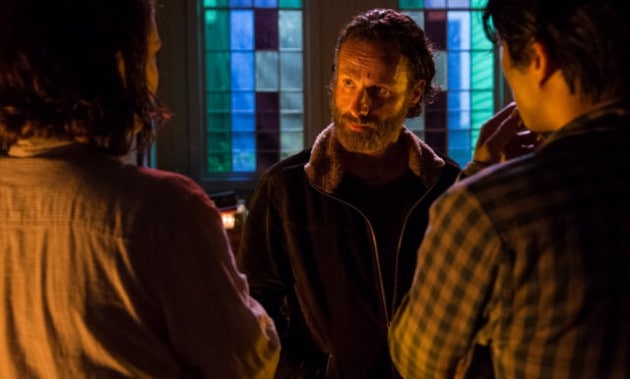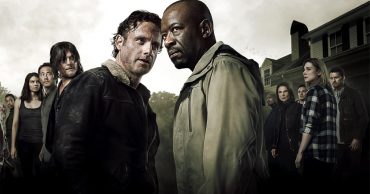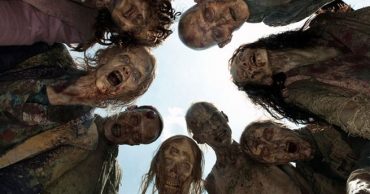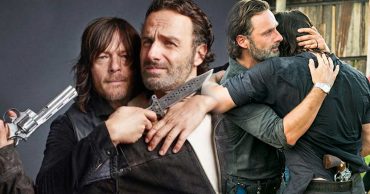
“Nightmares end… but they don’t have to end who we are.” – Bob
Though I didn’t expect Gareth and the fellow Terminus survivors to last the entire fourth season, the swiftness with which “Four Walls and a Roof” deals with this situation is impressive. More impressive, though, is the continued attention to character in “Four Walls and a Roof”, which continues to explore the malleable moralities of Rick and his group in comparison to those of Gareth and his – and surprisingly, The Walking Dead doesn’t try to come up with a definitive answer or position on what makes someone “good” or “bad” in this world. Instead of relying on strict, thin characterizations and simplistic philosophies, season five of The Walking Dead is wallowing in the dirt of post-apocalyptic humanity – and while it’s doing so, continues to solidify it’s position in the upper echelon of television dramas.
Watching Rick and company brutally murder Gareth, Martin, and the others is delivered as a typical The Walking Dead “shock” moment, appearing to revel in the violence Rick is able to commit in the name of protecting its people and family. But watch the way the camera lingers on the reactions of Maggie and the others; they all understand that Rick is pushing the limits of his own humanity, tearing into Gareth’s face with a machete as he finally follows up on the promise he made at Terminus’ bleeding trough. There are even camera angles looking up at a menacing Rick, blood dripping off the camera lens as if it was Gareth’s dying scare: in those moments, Rick’s willing lack of self-control becomes a reflection on his shrinking humanity, a humanity he’s desperately trying to cling onto. Lest we forget, he nearly gutted Gabriel before he admitted to locking his congregation out of his church a few scenes earlier, only allowing the man to live because of his honesty – and assumedly, in the shared knowledge that anybody who survived this long probably did some terrible things to other humans along the way.
That sense of humanity is a challenge presented to numerous characters throughout the hour, continuing the trend from last week, and enhanced by the presence of the Terminus cannibals in the same room with Rick’s group. The comparisons are undeniable: Gareth explains what they’ve done to survive, displaying how much it’s changed the way they act and think (and eat, obviously), and it draws a direct comparison to the things we’ve seen Rick and company do themselves over the past four-plus seasons. No longer are Rick and company going to sit around for episodes and decide what to do, or how to take out an adversary: when Bob’s body arrives on the church’s front steps (accompanied by a letter “A” written in blood), it’s only a matter of hours before the trap is set, Judith cries (conveniently), and then Terminus is no more, and Rick’s group is split in half, and moves forward.
That particular story bit (Rick and Abraham’s sudden pissing contest) is the only part of the episode that reeks of inorganic construction: it’s convenient that the group would split up again so quickly, driven by a difference in philosophy (where Rick simply wants to survive, Abraham is consumed by his “mission” to find a cure). It happens in the middle of other stories, interrupting the drama at hand, and requires a goofy negotiation (basically, Abraham agrees to put Eugene and his people at risk for 12 hours more than he wants to)to ensure that we’ll still care about these people when they leave Rick and company (hence why Maggie and Glenn all of a sudden agree to go with them; though it’s played as Glenn avoiding a fist fight, it’s clearly to keep us invested in this half of the splintered group).
I’m not saying this particular development wasn’t necessary: larger groups make it harder to tell smaller, more focused stories, and putting Abraham’s group on the road will certainly make it easier to keep dramatic tension high, with the ability to tell two stories at the same time, each with their own dramatic tambor. It comes about a bit awkwardly, sure, but it’s a welcome move: after so many seasons focused on singular locations or enemies, the last half-season or so has shown us how strong a show The Walking Dead can be when it keeps itself moving: and given how much story The Walking Dead‘s been able to successfully execute (in this case, literally) in three episodes, the sky’s the limit for one of the most-improved shows on television.
Other thoughts/observations:
– a quick note: if you want to hear me talk more about The Walking Dead, I recently guested on Sound on Sight’s The Walking Dead podcast, as well as dedicating a recent episode of The Mid-Season Replacements to a discussion of the show’s rapid, vast improvements.
[Photo via AMC]
 Follow Us
Follow Us




